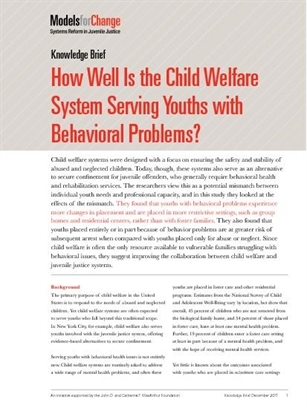Knowledge Brief: How Well Is the Child Welfare System Serving Youths with Behavioral Problems?
Published Dec 1, 2011, Models for Change Research Initiative
Download
(447 KB)

Child welfare systems were designed with a focus on ensuring the safety and stability of abused and neglected children. Today, though, these systems also serve as an alternative to secure confinement for juvenile offenders, who generally require behavioral health and rehabilitation services. The researchers view this as a potential mismatch between individual youth needs and professional capacity, and in this study they looked at the effects of the mismatch. They found that youths with behavioral problems experience more changes in placement and are placed in more restrictive settings, such as group homes and residential centers, rather than with foster families. They also found that youths placed entirely or in part because of behavior problems are at greater risk of subsequent arrest when compared with youths placed only for abuse or neglect. Since child welfare is often the only resource available to vulnerable families struggling with behavioral issues, they suggest improving the collaboration between child welfare and juvenile justice systems.
This brief is one in a series describing new knowledge and innovations emerging from Models for Change, a multi-state juvenile justice initiative. Models for Change is accelerating movement toward a more effective, fair, and developmentally sound juvenile justice system by creating replicable models that protect community safety, use resources wisely, and improve outcomes for youths. The briefs are intended to inform professionals in juvenile justice and related fields, and to contribute to a new national wave of juvenile justice reform.